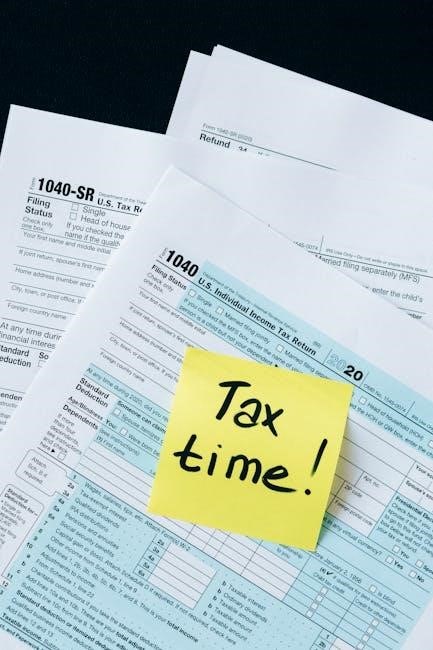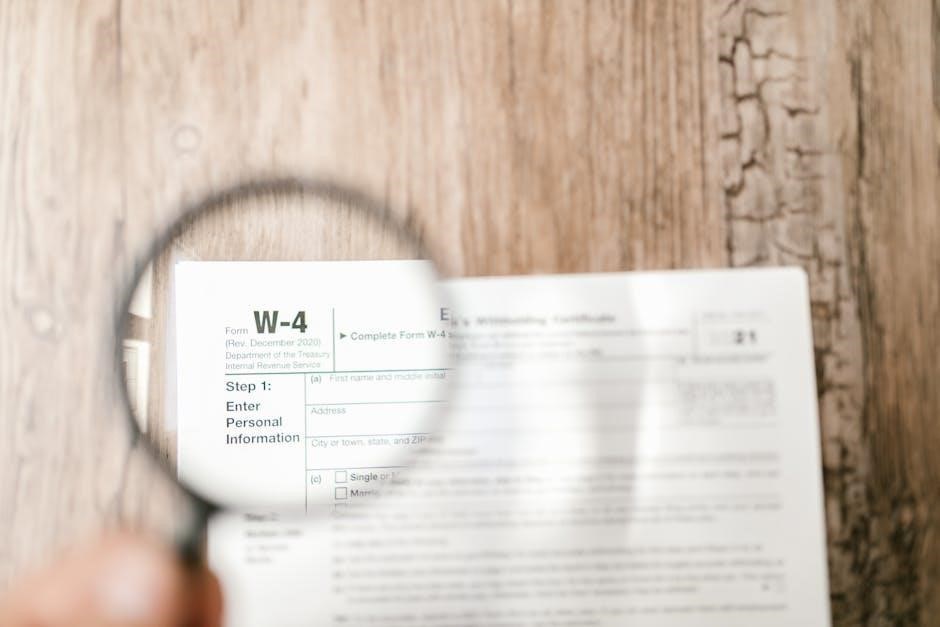Understanding landlord tax deductions is crucial for maximizing rental income and minimizing tax liabilities. This guide explores deductible expenses, helping landlords navigate complex tax rules effectively.
1.1 Overview of Tax Benefits for Landlords
Landlords can significantly reduce their taxable income by claiming various deductions related to their rental properties. Key tax benefits include mortgage interest, property taxes, insurance premiums, maintenance costs, and depreciation. These deductions help offset rental income, lowering overall tax liability. Additionally, expenses like letting agent fees, legal costs, and travel related to property management are often deductible. Understanding these benefits ensures landlords maximize their tax savings while staying compliant with tax regulations. Proper record-keeping and professional advice are essential to navigate the complexities effectively.
1.2 Importance of Understanding Tax Deductions
Understanding tax deductions is vital for landlords to minimize tax liabilities and avoid penalties. Accurate knowledge of deductible expenses ensures compliance with tax laws and maximizes savings. Misclassifying or overclaiming expenses can lead to audits and fines. Staying informed about tax rules, especially depreciation and operating costs, helps landlords optimize their financial strategies. Professional guidance is often necessary to navigate complex regulations effectively. Proper documentation and awareness of allowable deductions are essential for long-term financial success in rental property management.

Major Tax Deductions for Landlords
Landlords can claim significant tax deductions, including mortgage interest, property taxes, depreciation, and operating expenses. These deductions help reduce taxable income and maximize rental property profitability.
2.1 Mortgage Interest and Property Loans
Mortgage interest on rental properties is a key tax deduction for landlords. Interest paid on loans used to purchase or improve the property is fully deductible. This includes first and second mortgages, as well as home equity loans. However, personal loans or credit card interest used for non-property purposes are not eligible. Landlords should keep detailed records of loan payments and consult a tax professional to ensure compliance with IRS rules and maximize their tax benefits effectively.
2.2 Property Taxes and Local Assessments
Property taxes and local assessments are major tax deductions for landlords. These include state and local taxes on the rental property, which are fully deductible in the year they are paid. Additionally, local assessments for improvements, such as sewer or sidewalk upgrades, can also be deducted. Landlords should keep detailed records of these payments to ensure they maximize their tax benefits. Note that some jurisdictions offer tax relief programs for landlords who reduce rents, further enhancing potential savings.
2.3 Depreciation of Rental Property
Depreciation is a key tax deduction for landlords, allowing them to claim the gradual wear and tear of a rental property over its useful life. The IRS permits landlords to depreciate the value of the property (excluding land) over 27.5 years for residential properties. This deduction reduces taxable income significantly. Repairs are fully deductible in the year they occur, while improvements must be depreciated over time. Proper record-keeping and understanding depreciation rules are essential to maximize this benefit and ensure compliance with tax regulations.
Operating Expenses and Maintenance
Operating expenses and maintenance costs are fully deductible, covering utilities, repairs, and services. These essential expenditures help maintain property condition and reduce taxable rental income effectively.
3.1 Repairs vs. Improvements: What’s Deductible?
Understanding the distinction between repairs and improvements is vital for tax purposes. Repairs, which fix damage or maintain property condition, are fully deductible in the year incurred. Examples include fixing leaks or replacing broken appliances. Improvements, however, enhance the property’s value or prolong its life, requiring depreciation over time. For instance, upgrading a roof or installing new systems counts as an improvement. Proper classification ensures compliance with tax rules and maximizes deductions for landlords. Always consult tax guidelines or professionals for clarity.
3.2 Insurance Premiums for Rental Properties
Insurance premiums for rental properties are a key tax deduction, reducing taxable income. Landlords can deduct property insurance, liability coverage, and flood insurance. These are considered operating expenses. Keeping detailed records ensures accurate tax reporting. Consulting a tax professional helps in proper maximizing deductions and ensuring compliance.

Professional and Administrative Costs
Professional fees, accounting costs, and letting agent expenses are deductible. Tracking these ensures accurate tax reporting and maximizes financial benefits for landlords.
4.1 Letting Agent Fees and Legal Expenses
Letting agent fees and legal expenses related to renting and managing properties are deductible. These include fees for tenant screening, lease preparation, and resolving disputes. Legal costs for eviction proceedings or contract reviews also qualify. Ensure these expenses are directly tied to rental activities to comply with tax rules. Proper documentation is essential to support these deductions and avoid potential issues during tax audits. Consulting a tax professional can help maximize eligible claims under this category.
4.2 Accounting and Management Fees
Accounting and management fees are deductible expenses for landlords. These include costs for bookkeeping, tax preparation, and property management services. Fees paid to professionals for financial advice or rental property oversight also qualify. Ensure these expenses are solely for managing the rental property. Accurate records and receipts are essential to support these deductions. Consulting a tax professional can help landlords navigate complex rules and ensure compliance with tax regulations when claiming these expenses.
Travel and Transportation Expenses
Travel and transportation expenses related to managing rental properties are deductible. This includes trips for maintenance, inspections, or meetings with tenants or property managers.
5.1 Deductible Travel Costs for Property Management
Travel expenses for managing rental properties, such as flights, hotels, and car rentals, are deductible if solely for business purposes. Meals during trips are partially deductible. Keep receipts and logs to substantiate these costs, ensuring they align with IRS guidelines for business-related travel. Proper documentation is essential to avoid discrepancies and maximize eligible deductions for property management activities.

Other Allowable Deductions
Landlords can deduct utility bills, insurance premiums, advertising costs, and legal fees. These expenses reduce taxable rental income, offering significant tax savings when properly documented.
6.1 Utility Bills and Service Costs
Utility bills and service costs are deductible expenses for landlords, reducing taxable rental income. These include electricity, water, gas, and waste management services used for rental properties. Proper documentation is essential to support these claims. By accurately tracking and categorizing utility expenses, landlords can maximize tax benefits and ensure compliance with tax regulations. These deductions help lower overall tax liability, contributing to higher profitability for rental investments.
6.2 Advertising and Marketing Expenses
Advertising and marketing expenses incurred to attract tenants are fully deductible. This includes online listings, print ads, and signage. These costs are considered operational expenses and can be claimed in the year they are incurred. Proper documentation, such as receipts and invoices, is essential to support these deductions. By effectively marketing rental properties, landlords can reduce vacancy periods and increase rental income, making these expenses a valuable tax benefit for property owners.
Tax Relief Programs for Landlords
Landlords can benefit from tax relief programs, particularly for rent reductions and vacancies, helping to offset losses and maintain rental income stability during challenging periods.
7.1 Relief for Rent Reductions and Vacancies
Landlords facing rent reductions or property vacancies can claim tax relief under specific programs designed to support them during these challenging periods. This relief helps mitigate financial losses and ensures rental income stability. It is part of broader initiatives to assist landlords in managing unforeseen circumstances, ensuring they can continue operating effectively. Understanding and utilizing these programs is essential for maintaining profitability in the rental property market.
Advanced Tax Strategies for Landlords
Maximize deductions by leveraging depreciation, tax software, and professional consultations to ensure accurate reporting and compliance with evolving tax laws for optimal financial outcomes.
8.1 Maximizing Depreciation Benefits
Depreciation allows landlords to deduct the cost of property and assets over time, reducing taxable income. Understanding depreciation methods and periods is key to maximizing benefits. Landlords can depreciate rental property, appliances, and structural improvements, spreading costs over years. Accurate records and professional guidance ensure compliance and optimal savings. Properly classifying assets and understanding IRS guidelines help landlords claim the full depreciation allowance, significantly lowering their tax burden while maintaining property value and functionality.
8.2 Using Tax Software for Accurate Reporting
Tax software streamlines the process of tracking rental income and expenses, ensuring accurate reporting. Programs like Landlord Studio help organize financial data, automate calculations, and generate detailed reports. These tools also provide real-time updates on tax law changes. By reducing errors and ensuring compliance, tax software empowers landlords to maximize deductions and maintain precise records. Integrating digital platforms enhances financial management and simplifies tax submissions, making it easier to stay organized and compliant with regulatory requirements.

Common Mistakes to Avoid
- Overclaiming or misclassifying expenses can lead to audits and penalties.
- Failing to document expenses properly reduces eligible deductions.
- Ignoring tax law updates can result in missed opportunities or errors.
9.1 Overclaiming or Misclassifying Expenses
Overclaiming or misclassifying expenses is a common mistake landlords make, leading to audits and penalties. Ensuring expenses are legitimate and properly categorized is essential. For example, confusing repairs with improvements can result in incorrect deductions. Additionally, claiming personal expenses as rental-related can trigger tax issues. Keeping accurate records and understanding tax rules helps avoid these errors. Consulting a tax professional ensures compliance and prevents costly oversights, safeguarding your financial interests and maintaining adherence to tax regulations. Proper documentation is key to avoiding disputes with tax authorities.
Understanding landlord tax deductions is key to maximizing profits and compliance. Consult a tax professional, stay updated on tax laws, and maintain accurate records for optimal financial management.
10.1 Consulting a Tax Professional
Hiring a tax professional is essential for landlords to navigate complex tax rules and ensure compliance. Experts can help maximize deductions, including mortgage interest, property taxes, and depreciation. They also assist with accurate reporting, avoiding overclaiming, and staying updated on tax law changes. A tax professional can provide personalized strategies to minimize liabilities and optimize rental income, ensuring all expenses are correctly classified and reported. Their expertise is invaluable for maintaining financial health and avoiding legal issues.
10.2 Staying Updated on Tax Laws
Staying informed about tax law changes is vital for landlords to maximize deductions and avoid penalties. Tax regulations often evolve, impacting allowable expenses and reporting requirements. Regularly reviewing updates ensures compliance and identifies new opportunities for tax relief. Landlords should monitor government announcements, consult tax professionals, and subscribe to official updates. This proactive approach helps navigate complex rules, optimize financial planning, and ensure accurate tax reporting for rental properties.
